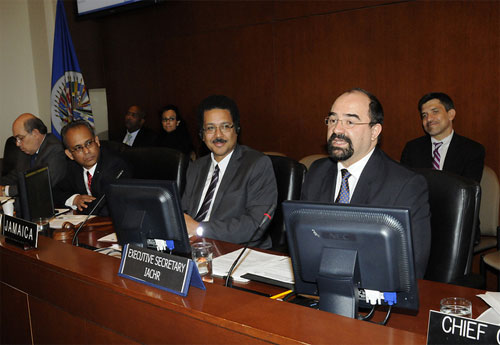Neither uncertainty about the continuity of chavismo in Venezuela nor the campaign of newly re-elected Ecuadorian President Rafael Correa have distracted the ALBA (Bolivarian Alliance for the Peoples of Our America) countries in their crusade against the Inter-American Commission on Human Rights (IACHR). Just over a year ago, they launched a campaign to weaken the powers of the IACHR, the organ of the Organization of American States (OAS) responsible for tracking and verifying the human rights situation in countries throughout the hemisphere.
Since mid-2011, a process started within the OAS to “strengthen” the inter-American system— with the main proponents of this process being the ALBA countries, most notably Ecuador and Venezuela. These countries have submitted proposals to weaken the independence and effectiveness of the Commission in various ways: by cutting its possibilities for financing; by denying it the power to issue reports on the countries of greatest concern; and by limiting its ability to seek urgent protective actions when serious threats of human rights violations arise.
These initiatives would not have gone so far and would not have achieved such success if the other states in the region, with some notable exceptions, had not adopted a passive and complicit acceptance of these proposals. As a result, we are now on the threshold of a reform that would reverse several decades of progress in the protection of human rights.
Negotiations at the OAS
In June 2012, the OAS General Assembly adopted a resolution that paved the way for the discussion on IACHR reform. The general discourse in Washington is that it has been a very fruitful process. The logic is that since there is a high degree of government involvement, the best proposals will most likely be selected: ones that actually help the inter-American system to adapt to the challenges of today.
But one does not have to dig very deep to find the real political game that looms behind these proposals. The end goal is not improving the system. Instead, the reform is a matter of honor for the Ecuadorian government, and to make it happen, several countries have jumped on board.
Ecuador has proposed a series of radical reforms that would entail, in practice, the elimination of the IACHR and its Special Rapporteur for Freedom of Expression. Its strategy is to introduce reforms that are quite extreme, then to acknowledge that it is open to dialogue and negotiation. The end goal is to then arrive at a “middle” point, which, in fact, would still be extreme by most standards.
Countries that do not accept the “midpoint” would then be seen as unwilling to compromise. This objective is critical to the ALBA countries’ interests: force adoption of the reform to be made by a vote rather than by consensus, the traditional way in which the OAS decides such matters. Between ALBA, the weaker states of Petro-Caribe and Mercosur, a majority vote could be reached that would end—in a half-day General Assembly— the only oversight body that now exists for these governments: the IACHR and its Rapporteur for Freedom of Expression.
The ALBA countries are in pursuit of this goal even though it is contrary to the very rules of international law. According to Article 39 of the American Convention on Human Rights, the IACHR Statute cannot be changed unless the initiative to do so is proposed in the Commission itself.
The IACHR Response and Alternatives to the ALBA
Since this process began, the Commission has made every effort to study the recommendations made by States. It launched a participatory discussion process, which included both victims of human rights violations and civil society. These discussions were held in various countries with forums in multiple cities. It convened public hearings and launched an e-consultation that revolved around five modules about which it received input from 11 states and hundreds of civil society organizations. Based on this information, the IACHR filed a document responding to each of the 53 recommendations made by the States in late October 2012. This response includes consideration of changes in the rules and practices of the Commission that took into account the concerns raised. However, no single proposal warrants reforming the IACHR Statute.
To move these proposals forward, this month, the Commission is presenting for consultation a draft amendment to its rules and practices, which will be approved in the first half of 2013. But Venezuela and Ecuador openly oppose any self-reform of the IACHR.
That is why the States who believe in universal values cannot remain silent accomplices in this crusade. Not taking concrete and vigorous action in support of the IACHR is tantamount to joining the Venezuela-Ecuador initiative. Different governments have expressed their satisfaction with the review process undertaken by the IACHR and the measures being put in place to address the concerns raised. If this support is only in speeches to the press and does not translate into how they will deliberate and vote, then the states with the worst human rights records will have a free hand to weaken a human rights system that is pivotal for peoples across the Americas.
From February to March, the OAS Permanent Council will discuss how to reform the powers of the Commission. The agreements they reach will then be taken to the General Assembly for approval, which is scheduled for March 22. Time is running out. Now is the moment to raise awareness among governments that reforms cannot threaten decades of forward progress of human rights.








